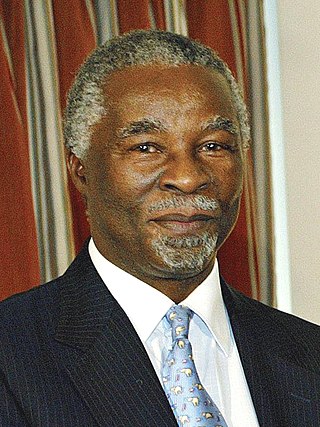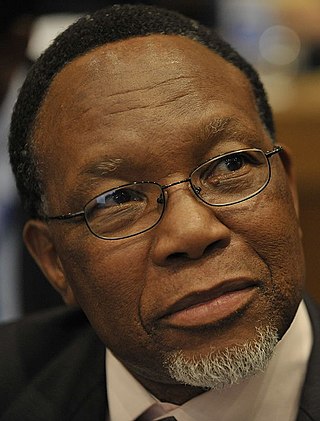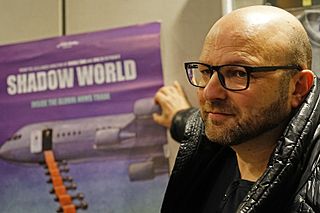
Thabo Mvuyelwa Mbeki is a South African politician who served as the 2nd democratic president of South Africa from 14 June 1999 to 24 September 2008, when he resigned at the request of his party, the African National Congress (ANC). Before that, he was deputy president under Nelson Mandela from 1994 to 1999.

Jacob Gedleyihlekisa Zuma is a South African politician who served as the fourth president of South Africa from 2009 to 2018. He is also referred to by his initials JZ and clan names Nxamalala and Msholozi. Zuma was a former anti-apartheid activist, member of uMkhonto weSizwe, and president of the African National Congress (ANC) from 2007 to 2017.
Schabir Shaik is a South African businessman from Berea, Durban, who rose to prominence due to his close association with former South African President Jacob Zuma during Zuma's time as Deputy President. On 2 June 2005, he was found guilty of corruption and fraud, which also led to Zuma's dismissal by then President Thabo Mbeki.

Nkosazana Clarice Dlamini-Zuma, sometimes referred to by her initials NDZ, is a South African politician, medical doctor and former anti-apartheid activist. A longstanding member of the African National Congress (ANC), she currently serves as Chancellor of the University of Limpopo.
The Schabir Shaik trial was an important court trial in post-apartheid South Africa. The case, tried in the Durban and Coast Local Division of the High Court before Judge Hilary Squires, established a fraudulent and corrupt relationship between Durban-based businessman Schabir Shaik and former South African leader Jacob Zuma.

The Directorate of Special Operations (DSO), commonly known as the Scorpions, was a specialised unit of the National Prosecuting Authority of South Africa formed by President Thabo Mbeki, tasked with investigating and prosecuting high-level and priority crimes including organised crime and corruption. An independent and multidisciplinary unit with a unique methodology which combined investigation, forensic intelligence, and prosecution, the Scorpions were known as an elite unit, and were involved in several extremely high-profile investigations, especially into the Arms Deal and into high-ranking African National Congress (ANC) politicians including Jackie Selebi, Jacob Zuma, and Tony Yengeni.

Kgalema Petrus Motlanthe is a South African politician who served as the 3rd president of South Africa from 25 September 2008 to 9 May 2009, following the resignation of Thabo Mbeki. Thereafter, he was deputy president under Jacob Zuma from 9 May 2009 to 26 May 2014.

South Africa since 1994 transitioned from the system of apartheid to one of majority rule. The election of 1994 resulted in a change in government with the African National Congress (ANC) coming to power. The ANC retained power after subsequent elections in 1999, 2004, 2009, 2014, and 2019. Children born during this period are known as the born-free generation, and those aged eighteen or older, were able to vote for the first time in 2014.

General elections were held in South Africa on 22 April 2009 to elect members of the National Assembly and provincial legislatures. These were the fourth general elections held since the end of the apartheid era.
The 52nd National Conference of the African National Congress (ANC) was held in Polokwane, Limpopo, from 16 to 20 December 2007. At the conference, Jacob Zuma and his supporters were elected to the party's top leadership and National Executive Committee (NEC), dealing a significant defeat to national President Thabo Mbeki, who had sought a third term in the ANC presidency. The conference was a precursor to the general election of 2009, which the ANC was extremely likely to win and which did indeed lead to Zuma's ascension to the presidency of South Africa. Mbeki was prohibited from serving a third term as national President but, if re-elected ANC President, could likely have leveraged that office to select his successor.

The Strategic Defence Package, popularly known as the Arms Deal, was a major defence procurement programme undertaken to re-equip the South African armed forces for the post-apartheid era. It is commonly associated with the large-scale corruption that is alleged to have taken place during and after the procurement process. Some critics have said that the Arms Deal was a defining moment or turning point for the African National Congress (ANC) government, less than five years into its tenure.

Corruption in South Africa includes the improper use of public resources for private ends, including bribery and improper favouritism. Corruption was at its highest during the period of state capture under the presidency of Jacob Zuma and has remained widespread, negatively "affecting criminal justice, service provision, economic opportunity, social cohesion and political integrity" in South Africa.
An indirect presidential election was held in South Africa on 25 September 2008 following the resignation of the President Thabo Mbeki. The ruling party, the African National Congress (ANC), with a two-thirds majority in the National Assembly of South Africa, elected Kgalema Motlanthe as president. The ANC indicated that Motlanthe would be a "caretaker" president until the 2009 election, after which ANC president Jacob Zuma would take office.

Andrew Josef Feinstein is a South African former politician, activist, filmmaker, campaigner and author, now based in London, who specialises in the investigation of the arms trade and the corruption that accompanies it. He is Executive Director of a small non-profit, Shadow World Investigations, and serves on the board of Declassified UK. The son of a Holocaust survivor, Feinstein was the first MP to introduce a motion on the Holocaust in the South African parliament.

The Congress of the People (COPE) is a South African political party formed in 2008 by former members of the African National Congress (ANC). The party was founded by former ANC members Mosiuoa Lekota, Mbhazima Shilowa and Mluleki George to contest the 2009 general election. The party was announced following a national convention held in Sandton on 1 November 2008, and was founded at a congress held in Bloemfontein on 16 December 2008. The name echoes the 1955 Congress of the People at which the Freedom Charter was adopted by the ANC and other parties, a name strongly contested by the ANC in a legal move dismissed by the Pretoria High Court.

The Directorate for Priority Crime Investigation (DPCI), commonly known as the Hawks, is the branch of the South African Police Service which investigates organised crime, economic crime, corruption, and other serious crime referred to it by the President or another division of the police. The unit was established in 2008 by President Jacob Zuma to replace the disbanded Scorpions.

Jacob Zuma's tenure as South Africa's fourth post-apartheid president began on 9 May 2009 and ended on 14 February 2018. He held office under a mandate from the parliamentary caucus of the African National Congress (ANC), which had governed South Africa since 1994 and which won comfortable majorities in the 2009 and 2014 national elections. His presidency was beset by controversy, and he faced, and defeated, an impeachment attempt and a record eight motions of no confidence in the South African Parliament, four of which went to a vote. His party asked him to resign in February 2018, ahead of the constitutional end of his second term.
Penuell Mpapa Maduna is a South African politician and businessman. An anti-apartheid activist in his youth, Maduna was appointed to President Nelson Mandela's government in 1994. Thereafter he served as Minister of Mineral and Energy Affairs and, between 1999 and 2004, as Minister of Justice and Constitutional Development. Holding a doctorate of law from Unisa, he was also a long-time legal adviser to his party, the African National Congress, which he represented during the negotiations to end apartheid.
Jacob Zuma, the former president of South Africa, is currently facing criminal charges relating to alleged corruption in the 1999 Arms Deal. He was first indicted on the charges in June 2005, but attempts to prosecute him have been beset by legal challenges and political controversy. He is currently charged with two counts of corruption, one count each of racketeering and money laundering, and twelve counts of fraud, all arising from his receipt of 783 payments which the state alleges were bribes from businessman Schabir Shaik and French arms company Thales.

The Enemy Within: How the ANC lost the battle against corruption (2022) is a book by Mpumelelo Mkhabela, a South African journalist and political analyst. The book is an account of how corruption entrenched its self within South Africa's governing party, the African National Congress (ANC) and the party's failed efforts to fight it.













